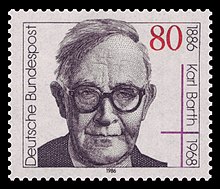Karl Barth
![]()
The title of this article is ambiguous. For other meanings, see Karl Barth (disambiguation).
Karl Barth (* 10 May 1886 in Basel; † 10 December 1968 ibidem) was a Swiss Protestant Reformed theologian. From 1911 he became involved as a radical democratic socialist. From 1914 he broke with the German liberal theology of his teachers, who supported the First World War. With his commentaries on the Epistles to the Romans (1919/1922) he founded dialectical theology. In 1934 he was instrumental in writing the Barmer Theological Declaration, co-founded the Confessing Church, and from 1938 called on all Christians to resist National Socialism, including armed resistance.
After 1945 he was strongly committed to reconciliation with the Germans, ecumenism and a comprehensive church reform. In 1947 he co-authored the Darmstadt Word. From 1950 he fought against German rearmament. From 1957 he called for cross-bloc resistance against nuclear weapons of mass destruction. During the Cold War he continuously contradicted principled anti-communism.
From 1932 to 1967 Barth's main work, the Kirchliche Dogmatik (KD), appeared in 13 partial volumes (unfinished). The KD still provides essential impulses for many Protestant churches and theological debates. Barth is often called and historicized in Protestantism as the "church father of the 20th century", but he rejected this for himself.

Karl Barth on a stamp of the Deutsche Bundespost (1986)
Works
On Barth's work see the
→ Main articles: The Epistle to the Romans (Barth) and Dialectical Theology
→ Main article: Ecclesiastical dogmatics
→ Main article: Barmer Theological Declaration and Christian community and civil community
Reception
Honors
Barth received eleven honorary doctorates throughout his life:
- 1922-1939; 1946ff University of Münster
- 1930 Glasgow University
- 1936 University of Utrecht
- 1937 University of Aberdeen
- 1938 Oxford University
- 1954 Budapest University
- 1956 Edinburgh University
- 1959 University of Geneva
- 1959 University of Strasbourg
- 1962 University of Chicago
- 1963 University of Paris
Other honors:
- 1950 Member of the American Academy of Arts and Sciences
- 1952 King's Medal for Service in the Cause of Freedom (UK)
- 1963 Sonning Prize of the University of Copenhagen
- 1966 Honorary Senator of the University of Bonn
- 1968 German Academy for Language and Poetry: Sigmund Freud Prize for scientific prose
- 1968 Appointment as member of the Académie des Sciences Morales et Politiques
Maintenance of the work
The Karl Barth Foundation was founded in Basel in 1971. Its goal is the publication of Barth's printed and unpublished estate. A complete edition of 75 volumes without the KD is planned, which will take several decades. The current director of the Karl Barth Archive is Peter Zocher. The Union of Protestant Churches (UEK) has awarded the Karl Barth Prize every two years since 1986 for an outstanding theological-scientific work. In 2015, the University of Basel and the Karl Barth Foundation founded the Karl Barth Center for Reformed Theology. The aim is "to keep Karl Barth's work and his approach to Protestant-Reformed theology present in teaching and research and to draw inspiration from it for theology, church and society." The center hosts lectures and other activities on various occasions. The EKD is planning a Karl Barth Year for 2019.
Meaning
→ Main article: Ecclesiastical dogmatics #Reception
Barth is considered the most influential Protestant theologian of the 20th century. He was the founder of dialectical theology, teacher of the Confessing Church, instigator of the Protestant resistance against National Socialism, the reconciler of peoples in the Cold War, who wanted to position the "church between East and West" and encourage a determined cross-bloc resistance to rearmament, which was to contribute to demilitarization and thus at the same time to the democratization of all Europe.
His KD is "an enormous work, comparable with no achievement in the recent history of Protestant theology" (Ernst Wolf). For Emil Brunner Barth "has given back to theology, which was about to lose itself in history and psychology of religion, its subject ... This breakthrough no one else than this powerful, vehement and ingenious spirit was able to accomplish."
Barth expert Michael Beintker registers a new openness to Barth's theology in the 21st century and points out that Barth has also inspired renowned contemporary poets and writers or that his thinking converges with theirs. The theologian Michael Trowitzsch has examined this literary reception of Barth in detail (Karl Barth heute, 2007).
Search within the encyclopedia